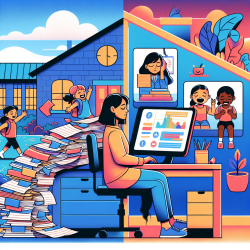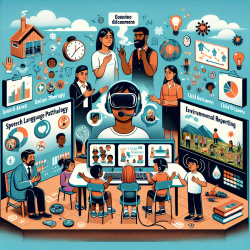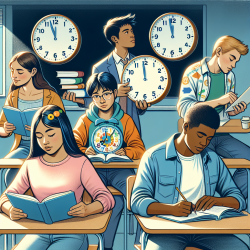Introduction
In the realm of educational psychology, understanding the dynamics of bullying and the role of social relationships in shaping adolescents' behaviors is crucial. The research article titled "Associations among Adolescents’ Relationships with Parents, Peers, and Teachers, Self-Efficacy, and Willingness to Intervene in Bullying: A Social Cognitive Approach" provides valuable insights into these dynamics. This blog post aims to help practitioners enhance their skills by implementing the findings from this research or encouraging further exploration.
Key Findings
The study, conducted with 2,071 adolescents from 24 schools in Germany, utilized Social Cognitive Theory (SCT) to explore how relationships with parents, peers, and teachers influence adolescents' self-efficacy and their willingness to intervene in bullying situations. The findings highlight several critical points:
- Positive Relationships Foster Self-Efficacy: Adolescents with strong parent-child and teacher-student relationships exhibit higher self-efficacy in social conflicts, which is crucial for intervening in bullying.
- Bullying Victimization Impacts Self-Efficacy: Experiences of bullying victimization negatively affect adolescents' self-efficacy, potentially hindering their willingness to intervene.
- Teacher Influence: Teacher-student relationships play a significant role in adolescents' willingness to intervene, highlighting the importance of supportive educational environments.
Implications for Practitioners
For practitioners working in schools or providing online therapy services like TinyEYE, these findings offer actionable insights:
- Foster Positive Relationships: Encourage strong connections between students and their parents, peers, and teachers to enhance self-efficacy and intervention willingness.
- Address Bullying Victimization: Provide support for students who have experienced bullying to rebuild their self-efficacy and empower them to intervene in future incidents.
- Leverage Teacher Influence: Train teachers to build positive relationships with students and create a supportive classroom environment that encourages intervention.
Encouraging Further Research
While this study provides valuable insights, it also opens avenues for further research. Practitioners are encouraged to explore the following areas:
- Longitudinal Studies: Conduct longitudinal research to establish causal relationships between social relationships, self-efficacy, and intervention behaviors.
- Diverse Populations: Replicate the study in different cultural and ethnic contexts to validate the findings across diverse populations.
- Intervention Programs: Develop and test intervention programs that focus on enhancing self-efficacy and social relationships to reduce bullying.
Conclusion
In conclusion, the research underscores the importance of social relationships and self-efficacy in addressing bullying. By fostering positive relationships and supporting students' self-efficacy, practitioners can create environments that empower adolescents to intervene in bullying situations. For those interested in delving deeper into the research, the original paper can be accessed here: Associations among Adolescents’ Relationships with Parents, Peers, and Teachers, Self-Efficacy, and Willingness to Intervene in Bullying: A Social Cognitive Approach.










